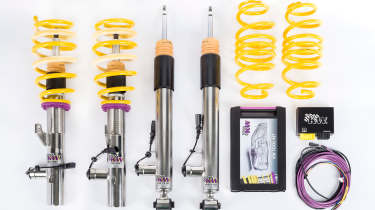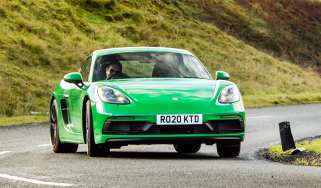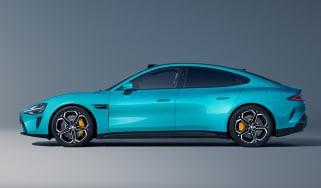Aftermarket car suspension explained: can modern cars really benefit from an upgrade?
As factory suspension setups become ever more sophisticated, does the aftermarket still offer a plug ‘n’ play option?
Unless you’re a professional chassis engineer, there’s a strong argument for leaving your car’s suspension well alone: a large team of experts spent tens of thousands of hours fine-tuning the ride and handling to be just-so, therefore the chances of you improving upon all their hard work are, well, slim.
However, the big names in aftermarket dampers – Koni, Bilstein, KW, Öhlins, etc – create products that are developed by professional chassis engineers who have honed their skills in motorsport and have strong ties to the types of car makers that find favour in evo (KW, for instance, supplied the coilovers for BMW’s extreme M4 GTS). This is why, despite the evermore sophisticated nature of dampers fitted to cars by their makers, the aftermarket continues to thrive, with customers prepared to trade production-car compromise (even on some very high-performance models) for a sharper focus in extreme conditions on road and track.
While in some ways it was ever thus, the aftermarket has had to evolve quickly to mirror recent changes in the high-performance market. A decade or so ago, electronically controlled multi- stage dampers were still something of a novelty; these days you’ll find them on top-end hot hatches. So the latest aftermarket offerings provide a similar adaptive damping capability for cars that don’t have it as standard, and for those cars that do they provide coil-over-damper units (coilovers) that plug into the existing electronics and retain the full functionality of the original system.
KW and Bilstein, for example, have aftermarket adaptive damper setups, based on a coilover configuration. (Öhlins, meanwhile, has been developing electronically controlled suspension technologies – CES, or Continuously controlled Electronic Suspension – for OEMs since the 1980s.) Bilstein calls its direct replacement adaptive damping system DampTronic, and it’s compatible with certain Porsches, BMWs, Mercedes and a handful of others. KW’s system is known as DDC (Dynamic Damping Control) Plug & Play, and for the moment is available for just a few BMW and Volkswagen models. Given how sensitive many modern whole-car electronic management systems are to outside interference, the fact that these replacement units can simply slot into the place of the originals is testament to the close relationship between some car makers and aftermarket suppliers.
The list of cars for which adaptive damping can be added where it isn’t present from the factory isn’t enormous yet, as the kits have to be tailored specially for individual cars and it’s a complex process, but on it you will find Audis, BMWs, Porsches, VWs, Mercs and the Range Rover Evoque. The KW DDC ECU system provides three settings accessible via a single button on the dashboard – Comfort (when the button illuminates blue), Sport (purple) and Sport+ (red). Bilstein’s Ridecontrol system offers the choice of Comfort or Sport, again courtesy of a facia-mounted button.
Both these German rivals also provide the dedicated chassis fettler the option of wireless control of the damper settings through an app on your smartphone or tablet – KW’s system works only on iOS devices, while Bilstein’s iRC module is also Android compatible. Both systems provide the regular array of modes (Comfort, Sport, etc), but they then allow you to fine-tune damping rates by small percentage points at a time and on individual axles, as well as setting the ride heights for specific conditions. You can also store up to five personal customised settings – one for your daily commute, perhaps, another for a lap of the Ring...
Öhlins has focused its aftermarket attentions on further developing ‘regular’ coilover technology and claims the results, in terms of damper reaction times and overall chassis performance, are superior to what can be achieved with electronically controlled systems. The Swedish company’s Road & Track range features what it calls a Dual Flow Valve (DFV), whereby the damper reacts as swiftly during the rebound phase as it does under compression. This means that the wheel stays in better contact with the road surface after, say, hitting a sharp bump that would otherwise bounce it off the deck.
> The fastest Nurburgring lap times
The advantages of DFV, says Öhlins, are manifold. Without sacrificing ride comfort, your car can run with far stiffer springs – in the case of the Porsche 911 GT3 RS, twice as stiff as standard – reducing squat, dive and roll, and keeping the tyres in better contact with the road surface, while improving steering response and stability, too. Compared with a PASM-equipped 997-generation GT3 RS on a 1min 30sec track, reckons Öhlins, its Road & Track setup gives an advantage of 1.6 to 1.8sec per lap, depending on the driver. A boost in confidence for less experienced track drivers is also claimed.
Adjustability remains a key draw of aftermarket dampers. KW’s three-way coilover kit for the BMW M2 amply illustrates this point, with 16 settings for rebound control, 14 for high-speed compression (straight-line driving and very quick corners), and six for low-speed compression (as you turn into sharper bends). Working out the ideal setup might take you a while...




